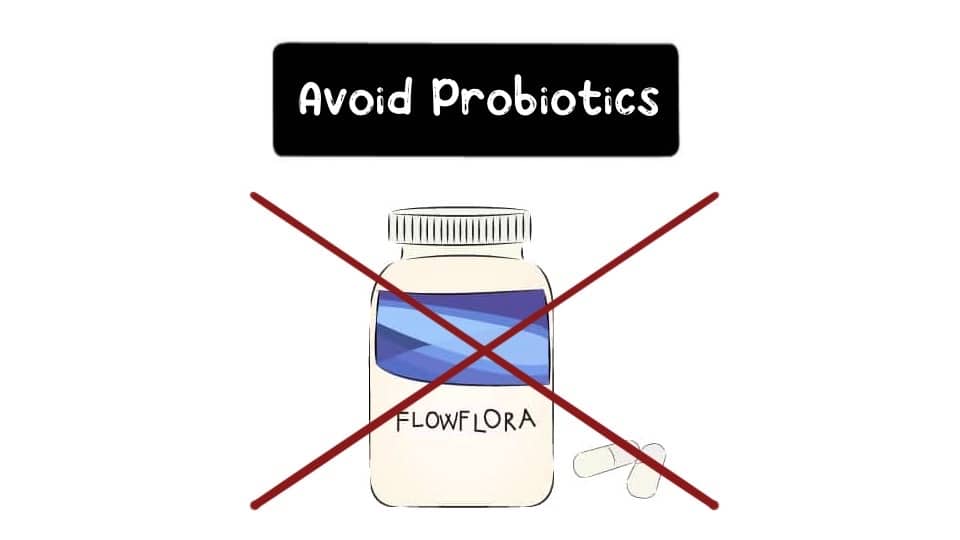Who Should Not Take Probiotics?

People who are immunocompromised, have pancreatitis, infants with short bowel syndrome, people with central venous catheters and patients in ICU should not take probiotics.
Probiotics are live microorganisms that, when administered in adequate amounts, confer health benefits to the host, particularly by promoting a balanced gut microbiota and improving various aspects of gastrointestinal function.
What Medical Conditions Are Risk Factors With Probiotics?
Probiotics are not recommend for use in those who have the following serious medical conditions.
Can I Take Probiotics If I Am immunosuppressed?
Probiotics are not recommended for those who are immunosuppressed. The definitive takeaway from a 2015 statement authored by V Stadlbauer, was that the effectiveness and safety of probiotics in immunosuppressed patients can vary depending on the specific medical condition.
For individuals who are immunosuppressed, it is important to approach the use of probiotics with caution. The current clinical evidence regarding the safety of probiotics in severely immunocompromised individuals is limited.
Immunosuppressed refers to a condition or state in which the immune system is weakened or suppressed, resulting in reduced ability to fight off infections and diseases.
can I take probiotics If I Have pancreatitis?
Probiotics are not recommended for those who have Pancreatitis. A 2008 study authored by MG Besselink, found probiotic prophylaxis should not be administered in patients with predicted severe acute pancreatitis due to the lack of reduction in infectious complications and increased risk of mortality and bowel ischemia associated with probiotic use.
Pancreatitis is the inflammation of the pancreas, which can cause severe abdominal pain and digestive complications.
Can An Infant With Short Bowel Syndrome Take Probiotics?
It is not advised for infants to take probiotics with short bowel syndrome. A 2004 study authored by AN Kunz, reported that two cases of Lactobacillus bacteremia occurred during probiotic treatment of short bowel syndrome.
This suggests a potential risk of sepsis associated with Lactobacillus supplementation in infant patients with short bowel syndrome. Therefore, caution should be exercised, and close monitoring for signs of sepsis is recommended when considering probiotics for individuals with short bowel syndrome.
Infants short bowel syndrome is a condition characterized by a significant reduction in the length of the small intestine, leading to challenges in nutrient absorption and digestion in newborns and young children.
Can I Take Probiotics With A Central Vein Cathteter?
You should not take probiotics if you have a Central Vein Catheter. A 2022 study authored by S MAYER, found probiotic administration in Intensive Care Unit patients with central venous catheters is associated with an increased incidence of probiotic-associated central line infections (PACLIs) and a significant increase in mortality. Therefore, probiotics should not be taken in this population due to the elevated risk of infection and higher mortality rates.
A central venous catheter is a medical device inserted into a large vein, typically in the neck, chest, or groin, to facilitate the administration of medication, fluids, or blood products, as well as the monitoring of various medical parameters.
What drugs or supplements Should Be Avoided With Probiotics?
You can take probiotics with most medication and supplements without major issues. There are however things to keep in mind when taking probiotics with the following 3 medications below.
can i take probiotics with immunosuppressants?
You should talk to your doctor before taking probiotics with Immunosuppresant medication like Prednisone. Severe immunocompromisation or immunosuppression can impair the body's ability to respond appropriately to microbes, making it risky to consume probiotics in such cases.
Can I Take Probiotics With Antibiotics?
You can take probiotics with antibiotics together at the same time according to a 2013 study authored by, Blake C Rodgers, MD. You can also leave a 1-2 hours gap when taking probiotics and antibiotics to be extra safe.
Can I Take Probiotics With Antifungals?
You can take probiotics with antifungals according to increase effectiveness according to a 2022 review authored by Z Mollazadeh-Narestan but this however is not true for Saccharomyces boulardii, which is a fungus. Taking antifungals can reduce the effectiveness of S. boulardii.
What Are The Side Effects Of Probiotics?
The side effects of probiotics are typically mild and temporary, including gas, bloating, abdominal discomfort, and occasionally, diarrhea. However, serious side effects are rare and mainly occur in individuals with weakened immune systems. It's important to consult a healthcare professional before starting probiotic supplementation, especially if you have underlying health conditions or are taking immunosuppressive medications.
Dr. Sara Mesilhy has a Master’s degree in Gastroenterology and holds a membership with the Royal College of Physicians of the United Kingdom. She completed her Bachelor of Medicine, Bachelor of Surgery (MBBS) at Cairo University and is currently part of the ProbioticReviewGirl medical team.